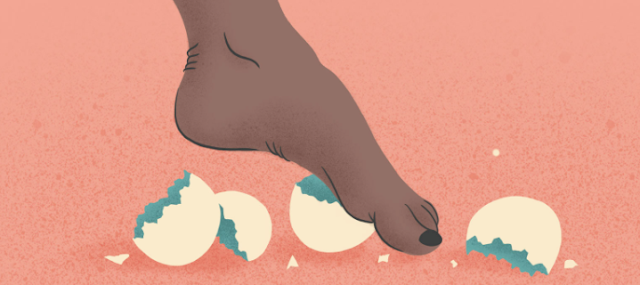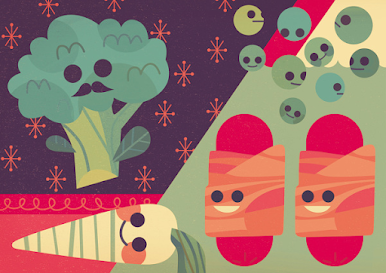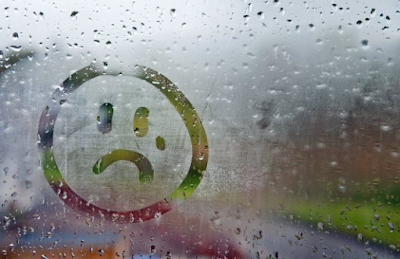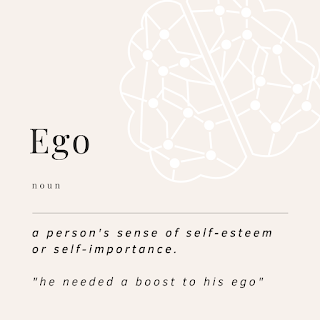WALKING ON EGGSHELLS - WITNESSING DOMESTIC VIOLENCE
This is one of the more difficult pieces I have chosen to write, but as I was pulling together content in preparation for National Domestic Violence Awareness Month and reading about other people's experiences, it became clear to me I had my own story to tell, and what better time than now?
Not only because I am reflecting on a time when the world around me felt hostile and frightening, but also because I am still unable to fully reconcile the loving, affectionate father I doted on (and who doted on me in return) with the violent, unpredictable bully he sometimes turned into. I never knew which dad I would get, and I often found myself walking on eggshells, even when he was in a good mood, for fear of something setting him off. I never knew how long the good mood would last and so never took it for granted when this was the case.
On a good day he was the best dad in the world. On a bad day he was terrifying. I loved, and still love my dad fiercely. But I also know that what he did to the people in his life was, at best, unacceptable and, at worst, cruel and abusive. How does a child even begin to reconcile this conflict? They often don’t, and are damaged.
My dad was an alcoholic. He was always a drinker, and the disease progressed from around the time I was born, progressing into end stage alcoholism by the time I was in my early 20s. Alcoholism led to my dad’s death from alcohol related kidney and heart failure in 2013. He was 56 years old. I have left out the details about how brutal this decline was. It was traumatic to watch.
It is recognised that men who are dependent on alcohol or drugs are six or seven times more likely to be involved in domestic abuse against women than others1. Having said that, although domestic violence is more prevalent in homes where there is alcohol and drug use, it does not necessarily cause it. In other words, someone with a propensity for being violent towards their partner may find their abusive behaviours are exacerbated by drinking or taking drugs, but will likely still exhibit abusive behaviours while not under the influence. Substance misuse can be a contributing factor, but is in no way an excuse or a reason for domestic abuse.
Of all the trauma I have experienced in my life, witnessing domestic violence has been the one thing that if I close my eyes now, I can still see, feel and hear it as if it happened yesterday, even though I was a child at the time. I can even smell the room, stale with cigarette smoke, weed and alcohol. We are talking about events that occurred over 20 years ago, yet they have never fully left me.
Even now, following years of therapy and beginning my own recovery from addiction, I feel guilt and perhaps some deep-rooted shame about sharing this side of my family history, as if somehow I am betraying my dad. He was a fiercely intelligent, spiritual and complex, but also a deeply flawed person with demons that he never faced head on, or even really acknowledged. His ego and pride built a wall between him and any kind of surrender or acceptance of the fact that he had an illness that needed treatment. Nothing could break through. Perhaps I thought I could at some point, but now I know that wasn’t the case. Having said all of this, he was my dad and I will always love him as his daughter, flaws and all. When he was well, he was loving and kind, and taught me so much about the world that I still carry with me today. I doted on him. When he was sick he was the Devil.
I am 13 years old, curled up in a ball on my dad’s sofa, with my eyes scrunched closed and my hands over my ears. I can still hear the banging and shouting, moving from room to room around my dad’s two-bedroom council flat. I can hear my step-mum pleading frantically with him to calm down and that she is sorry for upsetting him, but please stop, you’re scaring the children.
Dad came home to find that my little brother’s stitches holding together a thumb injury had popped open. He is only 18 months old and he is screaming the place down, like any toddler would. My step-mum was trying to calm him down enough to take a look at the damage when dad got home sooner than expected. He has been drinking. It is immediately obvious to me - I can always tell when he has been drinking. I learned to recognise the changes in the way he walks, the drooping of his eyelids, the slurring of his speech, the overly affectionate coddling and his use of pet names like ‘Lestie’ from an early age - for as long as I can remember. And today, I notice quickly, dad is really drunk. And not in a good mood. No affectionate kiss and cuddle today.
I know what is coming before it begins. I can feel the rage coming off him as he walks through the door. Much like I know when he has been drinking, I know when dad is angry. I can feel it radiating off him like an odour, but one only I can detect. My step-mum knows too.
He doesn’t need a reason, but my brother bleeding and screaming is a good enough excuse to unleash his rage. Today he doesn’t hit my step mum though. He decides the doors will take the brunt of his anger today, and proceeds to kick each door in the flat down, one by one, screaming about how f**king tired he is of everyone’s bulls**t. Can’t people just giving him a f**king break just for one f**king day. Why does he have to come home to this chaos? What the f**k is he supposed to do now? On and on. Louder and louder. Every other word is a curse. Each door needs a good 3 or 4 hard kicks before buckling from their hinges. Dad is a small man at around 5 ft 4, but he is strong. He can fight. In fact he prides himself on it.
This time is worse than others. It’s going on for longer and he isn’t calming down. He is getting louder, angrier and scarier. I cover my ears and close my eyes tightly, hoping he doesn’t hit anyone this time, that his anger will only be taken out on the doors. Will he hit me this time? He comes into the living room where I am and I hear a small voice say stop it! Please, stop shouting! You’re scaring me.
It is me. For the first time, I am using my tiny voice to try and make the storm of my dad’s rage stop. For there to be calm again. For him to be ‘good’ dad again. He has been possessed. I want my dad back.
I say it again, louder this time. DAD STOP IT YOU’RE SCARING ME. STOP IT.
He stops this time. I am hysterical. Struggling to breathe. I am crying so hard I can’t see more than my dad’s outline coming towards me. I am smothered in his embrace and the smell of stale cider and cigarettes. He kisses my head and holds me close to him. I can’t breathe.
I am so sorry Lestie, he sobs. I just got angry. Daddy doesn’t mean it. You know I would NEVER hurt you, right? Daddy would never lay a finger on your or your brother or sister. I just get angry sometimes and need to let it out. I’m sorry, he cries. Full of self pity. I let him comfort me, relieved that my dad is back.
My step mum tries to comfort me too, but she is just as scared, just as exhausted and she doesn't have the comfort of knowing that he would never hit her. He already has, more than once and I have been witness to much of it. And there will be more to come.
I am 15 years old, on the sofa in the same flat. I am watching a film with my little half-brother and half-sister. They are 3 and 5. Dad is drinking his usual can of cider and smoking a rollie. Shirt off, tattoos on show, shaved head and jeans. He sits on the edge of the sofa, leaning over the coffee table, constantly flicking his ash into the continuously overflowing ashtray. My auntie and uncle are over and everyone is drinking. My uncle and my dad are arguing as usual but nothing more than the usual brotherly banter. I’m used to it, but I always have an ear trained to notice any changes in dad’s demeanour, just in case things start to escalate.
I am constantly on guard. Many a Sunday afternoon, which was ‘family time’ at my nan’s house, ended in a punch-up between my dad and uncle. It was more likely than not that someone would end up fighting. It was my normal. My whole family were alcoholics, although I didn't know this at the time.
Voices start to rise and before I know it dad is up and off the sofa and right up to my step mum to shout in her face. My little brother and sister instinctively lean into me and I put one arm around each of them.
Dad pushes my step-mum. She is taller than him so he has to show her how strong he is. Small man syndrome. She doesn’t push back but shouts, getting in his face. Dad responds by grabbing her around the neck with both hands and pushes her up against the wall. He is strong and her feet are barely touching the floor.
I am terrified. Petrified. My sister is screaming at dad to let her mum go. She is only 5. My auntie tells me to take them both outside and to wait outside the front door until an adult comes to get us. They will tell me when it is safe again. Let the adults take control and it will all be ok. They know what they are doing.
I do what I am told. The three of us sit on the doorstep and wait. My brother is silent as he often is. My sister is crying quietly and I hold her. I am numb. Beyond frightened at how quickly dad went from being fine to furious.
I can’t seem to remember the immediate before or after of these events. It’s like the trauma is imprinted in my memories, as clear as they were over 20 years ago but without context. Had there been warning signs? Could we have stopped him? Had he been in a good mood for much of that day and suddenly became possessed, by what dad himself would later refer to as his ‘demons’.
I do remember feeling guilty. I still do sometimes. Like if I was a better daughter and wasn’t so needy, loud or visible then dad might not get so angry and frustrated. Like simply existing was enough to make him angry. I didn’t know at that age that it had nothing to do with me and everything to do with him.
The simple fact is that dad was an alcoholic and when he drank he got violent. He needed to feel like he had control of everything around him and when things didn’t go his way the only way he knew to exert his authority, to vent his frustrations, was to hit things and people. To lash out at those who loved him most. I for one always went running back with instant forgiveness, just grateful that he still loved me.
My mum split from my dad when I was a baby. I learned as an adult that she left my dad with me in her arms as an 18 month-old with a knife to his throat, as he told her that she would leave with me ‘over his dead body’. So she did what she had to do, and almost did. Thankfully for us, dad was also a coward so her threat was enough for him to back down and let her leave. And she never looked back.
She did leave, but some victims can’t. Some don’t have the tools to do so. Some are forced to stay due to their financial and housing situation. And for some, the fear of the consequences of leaving is too great. Asking a domestic violence victim why they ‘didn’t just leave’ is insinuating that they are somehow complicit in their experience, which is not the case.
She has never spoken about any other violence, only to confirm that he was an emotional abuser and a bully. This is not any less painful to know. Sometimes words and emotional abuse can hurt just as much as fists. It's a different form of violence, but violence nonetheless.
It is heart breaking still to me that one of my earliest formative experiences was me being held between my mum, my dad and a knife, with my mum literally leaving for her life. Even now I am in my own recovery, and have worked through a lot of my childhood trauma, this still affects me. The thought of my calm, introverted, conflict-averse mum resorting to these measures to protect us is something I struggle to come to terms with. I often wonder if the exposure to this situation and the ones that followed were part of what shaped me into the person I became - isolated, resentful, scared and in the end, an addict.
As a family, we never spoke about any of it. Talking about it would mean we would have to face the fact that it happened, and no one wanted to do that, especially after he died. I had to go along with the sanitised memories and ‘wasn’t it funny when dad did x’ stories that everyone shared. Don't get me wrong, I have many warm and funny memories of my dad, but I often found myself boiling up inside, wanting to scream that he was also mean, cruel and very unwell. He hurt the people around him and he hurt me more than anyone will ever know.
There it is again, that conflict. Even writing this, I feel like a traitor. I have so much love for the dad who was kind and affectionate and taught me so much. But I cannot and will not pretend that was all he was. Dad was never possessed. He was unwell and what I experienced as a child was two sides of the same coin. As hard as it is for me to accept, dad was an abuser. He may have had his demons, but nothing can condone what he did. Alcohol didn’t do this, he did.
We need to talk about our experiences of domestic abuse and violence - as victims, witnesses and perpetrators. It isn’t pretty and it isn’t fun. But I do believe that when we are ready to revisit the dark and scary places, we can be released from at least some of our pain and become empowered to move forward in our own lives and be better than those before us. Let’s not make the same mistakes. Let’s begin to break the cycle of violence and abuse and end this generational trauma.
It didn’t start with us but it can end with us.
As ever, thanks for reading, and feel free to feed back with any ideas or thoughts on this topic or anything else that you would like to share, at celestialrecovery@gmail.com
Celeste is in recovery from addiction and is passionate about exploring ways we can be accountable for ourselves, while practising radical self-compassion. They have embraced the spiritual aspect of their recovery, and find peace in simple pleasures.
FURTHER READING AND SUPPORT RESOURCES
Nacoa - National Association for the Children of Alcoholics
How Witnessing Domestic Violence Affects Children - Article
Domestic Violence UK - Support and Help
REFERENCES
1 https://journals.plos.org/plosmedicine/article?id=10.1371/journal.pmed.1002995






Comments
Post a Comment